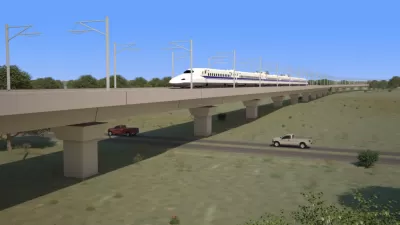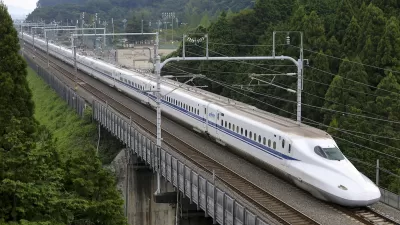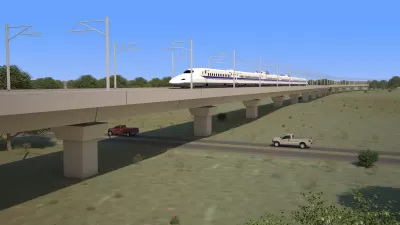The Texas Attorney General took a break from its crusade against unsubstantiated claims of voter fraud to weigh in on a controversial question of property rights.

Legal questions about the use of eminent domain for the Texas Central Railway high-speed rail system between Houston and Dallas are persisting nearly six months after the Texas Supreme Court refused to hear an appeal for a lawsuit filed by a Leon County landowner, James Miles, potentially affected by the route's construction.
Planetizen picked up news of the unanswered legal questions surrounding the use of eminent domain for the Texas Central Railway in 2014, 2016, and 2020. In 2021, the news seemed mostly positive for Texas Central after the private rail company signed construction contracts signed and bagged the aforementioned decision by the state's highest court.
According to an article by Alexa Ura for the Texas Tribune, however, the legal case against the company's use of eminent domain has a powerful new proponent, adding a new twist in the saga.
"The Texas attorney general’s office has put its weight behind a landowner’s case against the companies developing a controversial Dallas-Houston bullet train, arguing they can’t force people to sell parcels needed for the high-speed rail project," writes Ura.
"In a legal brief filed with the Texas Supreme Court on Friday, deputies for Texas Attorney General Ken Paxton argued the high court should reverse that appellate decision and rule in Miles’ favor because the companies fall short of the Texas Constitution’s definition of a rail company," explains Ura.
If Texas central clears these legal hurdles and acquires the necessary funding (promised to be sourced from private sources), the system would accommodate trains traveling up to 205 mph and making the trip between Dallas and Houston—which takes four hours by car—in 90 minutes.

Study: Maui’s Plan to Convert Vacation Rentals to Long-Term Housing Could Cause Nearly $1 Billion Economic Loss
The plan would reduce visitor accommodation by 25,% resulting in 1,900 jobs lost.

North Texas Transit Leaders Tout Benefits of TOD for Growing Region
At a summit focused on transit-oriented development, policymakers discussed how North Texas’ expanded light rail system can serve as a tool for economic growth.

Why Should We Subsidize Public Transportation?
Many public transit agencies face financial stress due to rising costs, declining fare revenue, and declining subsidies. Transit advocates must provide a strong business case for increasing public transit funding.

How Community Science Connects People, Parks, and Biodiversity
Community science engages people of all backgrounds in documenting local biodiversity, strengthening connections to nature, and contributing to global efforts like the City Nature Challenge to build a more inclusive and resilient future.

Alabama: Trump Terminates Settlements for Black Communities Harmed By Raw Sewage
Trump deemed the landmark civil rights agreement “illegal DEI and environmental justice policy.”

Dear Tesla Driver: “It’s not You, It’s Him.”
Amidst a booming bumper sticker industry, one writer offers solace to those asking, “Does this car make me look fascist?”
Urban Design for Planners 1: Software Tools
This six-course series explores essential urban design concepts using open source software and equips planners with the tools they need to participate fully in the urban design process.
Planning for Universal Design
Learn the tools for implementing Universal Design in planning regulations.
City of Santa Clarita
Ascent Environmental
Institute for Housing and Urban Development Studies (IHS)
City of Grandview
Harvard GSD Executive Education
Toledo-Lucas County Plan Commissions
Salt Lake City
NYU Wagner Graduate School of Public Service




























